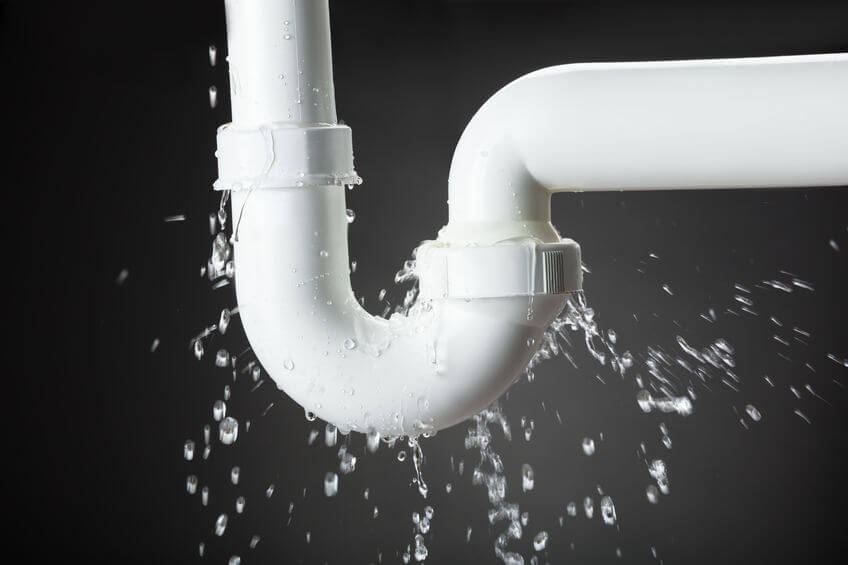Learn More About Leaking Pipes
There are many instances where an emergency plumbing situation will occur, most often then not they will have to do with leaking pipes. Leaking pipes can be particularly confusing to handle as oftentimes plumbing pipes are behind walls or underground so until visual cues enter like mold, mildew, and sagging areas most don’t know that a leak is there until it’s too late. With plumbing tools and technology there are ways to track down leaks so all is not lost in making the necessary repairs and replacements if they are needed. It’s essential to call your local plumber if you notice something is amiss with your home as catching the problem when it’s at it’s beginning stages can prevent future issues from arising. Here is some general information concerning leaking pipes that may prove useful to you.
What causes pipes to leak?
Leaking pipes can occur from a wide variety of reasons from high water pressure, root invasion, physical impacts, and more. With high water pressure, you run an increased risk of pipes bursting as inner pipes can corrode and wear resulting in leaks. Root invasion will occur when tree roots grow near porous piping materials or can be powerful enough to loosen pipe connections. A common concern with leaking pipes is with impacts that cause punctures or movement with the piping system enough to cause an opening for leaks. Other causes with leaking pipes can include rust, slab/foundation movement, and temperature changes.
How do I know if a pipe is leaking?
There are many signs that can point towards water waste with leaking pipes. One such method is with seeing very high water bills as water is being lost more than normal. Another is to see mold or mildew growth on the walls from access moisture. If you see water stains, warping, bubbling, or sagging on walls or floors this can also point to water abnormal accumulation. Musty smells are also a huge sign as old water will give off this perfume.
How can you tell where a water leak is coming from?
With leaking pipes, you’ll want to check your water meter to see if there are any leaks by seeing if the leak indicator is moving; if it is there is a leak in your pipes. For this test make sure that no water is running inside or outside your home. (The meter itself should be a small triangular shaped dial or small silver wheel that rotates when water is flowing through the meter.) You may also see the meter reading and see after 1 or 2 hours the reading has changed which indicates a leak. This test too requires the water to be turned off at all locations.
Is there a tool to detect water leak?
There are tools to detect leaking pipes with professional sound detection equipment. This will use a microphone and headphones to detect the sound of water running through pipes. Other types of equipment will use echolocation to determine the area where the leak has most likely taken place.
How do I stop a leaking pipe?
Leaking pipes can be fixed if there is misalignment and fittings need to be tightened.
Will a small water leak seal itself?
With small leaking pipes over time, it can grow into bigger issues if left unaddressed. You can create a temporary seal around the pipe with epoxy or plumbers putty yet various factors can cause the hole to become larger causing additional pipe damages.
Will plumbers putty stop a leak?
Leaking pipes can be fixed by plumber’s putty only if leaks are in specific areas. For other leaks, you may need an alternate solution. (This item and be used interchangeably with other products such as tape or caulk.)
What is the best sealant for leaking pipes?
- Rust-Oleum 265495 LeakSeal Flexible Rubber Coating Spray, 11 oz, Clear
- Rust-Oleum 275116 LeakSeal Flexible Rubber Coating, 30 oz, Crystal Clear
- Flex Seal Spray Rubber Sealant Coating, 14-oz, White/Clear
- Loctite 1716864 Tube Plumber and Marine Adhesive
What do plumbers use to seal joints?
Leaking pipes coming from joints can be sealed with a pipe jointing compound, aka pipe dope, which is a type of sealant used on threaded pipes. It consists of a mix of certain substances such as clay, kaolin, rosin, vegetable oil, and ethanol. This type of seal can also be used as a lubricant for pipe joints.
Does homeowners insurance cover water damage leaking plumbing?
Homeowners insurance covers leaking pipes if they were brought on by an accident or happened suddenly like with a washing machine supply hose breaking suddenly. If they were brought on by poor maintenance than it won’t be covered.
Contact A Professional Plumber
If you’re concerned that you may have leaking pipes get in touch with your local plumbing company so quality repairs can be made. They’ll be able to properly track down the location of the leak and offer you insight on what options you have for repairs or replacements. Ensure that the flow of your water is running smoothly and the conditions of your plumbing materials are in good order. Your local plumber is there to help you out.
If you need help with leaking pipes in Fort Worth, TX call (817) 476-9963 with Molberg Plumbing LLC!

